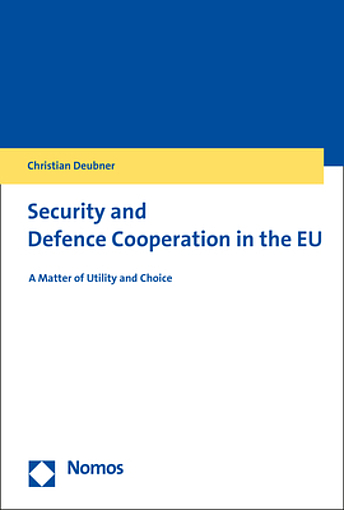englischAgainst the backdrop of past and present challenges, the author of this book probes the comparative utility of the EU Member States’ principal cooperation options in security and defence in terms of their scope, institutions and procedures, and the EU Member States’ choices in this respect over the past two decades. EU Member States have not demonstrated a preference for cooperation in that policy area so far and are not likely to do so in the near future either. There is no specific common purpose that would justify a significant effort to strengthen future EU cooperation on its Common Security and Defence Policy in 2017. NATO, ad hoc coalition forming and UN peacekeeping appear and will appear more useful and important for EU Member States in the medium term.
In recent years observers have been struck by how much internal security threats, radical Islamist terror attacks and the Member States’ discord over migration have influenced the reorientation of the EU Member States’ external security and defence policies. In that increasingly important nexus, the author proposes ideas for a more systematic approach to research.
Vor dem Hintergrund früherer und kommender Herausforderungen vergleicht der Autor den Wert verschiedener Formate für die Sicherheits- und Verteidigungs-Zusammenarbeit der EU Mitgliedstaaten (EU-MS). Dabei erweist sich seit über zwanzig Jahren ihr geringes Interesse an der Nutzung des EU-Rahmens mit der GSVP. Die Zusammenarbeit in der NATO, unilaterales Vorgehen oder ad-hoc Koalitionen und die Teilnahme am UN-Peacekeeping sind und bleiben auch auf mittlere Sicht für die EU-MS nützlicher und wichtiger. Der Autor erklärt das aus den Schwächen der GSVP in Bezug auf ihren Wirkungsbereich, auf ihre Institutionen und ihre Verfahren. Und auch weiterhin fehle ein besonderer gemeinsamer Zweck, der für das Jahr 2017 noch eine große Anstrengung zur Stärkung der GSVP rechtfertigen würde.
Neu ist, wie stark seit einigen Jahren Bedrohungen der inneren Sicherheit, radikal-islamistische Terrorangriffe, und die Uneinigkeit der MS über die Migrationspolitik die Neuorientierung der äußeren Sicherheits- und Verteidigungspolitik beeinflussen.
Für diesen immer wichtigeren Zusammenhang macht der Autor Vorschläge für einen systematischen Untersuchungsansatz.



